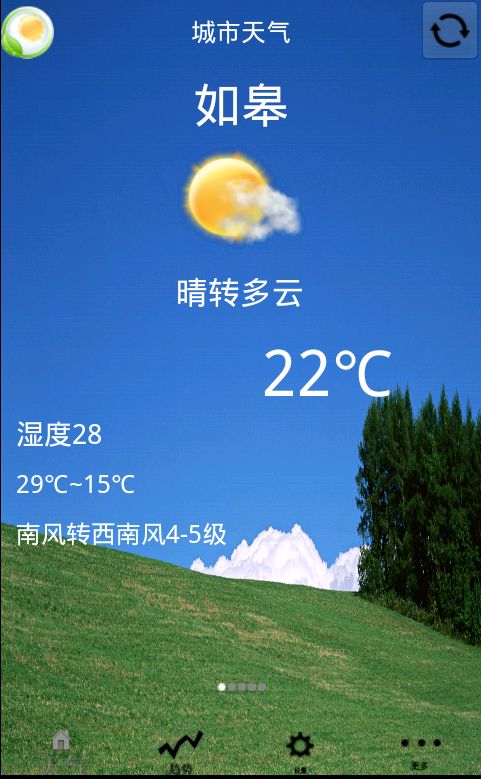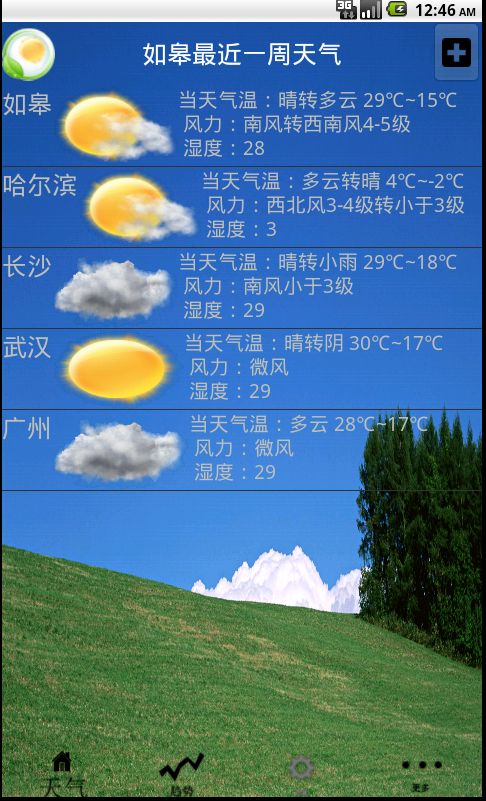android版天气预报程序开发总结
一,开发中所涉及到的技术概括:
tabhost选项卡组件,pagerAdapter左右滑屏的实现,json数据解析,xml数据解析,ListActivity与BaseAdapter的结合实现数据和图片的列表显示,handler更新UI,单例模式实现在整个project下数据的共享,httpClient访问网络,sqlite轻量级数据库的运用
二,程序运行效果展示:
三,关键代码注解:
1.tabhost组件运用:
布局文件代码如下
<?xml version="1.0" encoding="utf-8"?>
<TabHost xmlns:android="http://schemas.android.com/apk/res/android"
android:id="@android:id/tabhost"
android:layout_width="fill_parent"
android:layout_height="fill_parent"
>
<LinearLayout
android:layout_width="fill_parent"
android:layout_height="fill_parent"
android:background="@drawable/yun4"
android:orientation="vertical" >
<RelativeLayout
xmlns:android="http://schemas.android.com/apk/res/android"
android:id="@+id/biaotouFramelayout"
android:layout_width="fill_parent"
android:layout_height="64dp" >
<!--
<ImageButton
android:id="@+id/shuaxinButton"
android:layout_width="wrap_content"
android:layout_height="wrap_content"
android:layout_gravity="right"
android:layout_marginTop="10dp"
android:src="@drawable/shuaxin" />
-->
<ImageView
android:id="@+id/imageView5"
android:layout_width="53dp"
android:layout_height="65dp"
android:src="@drawable/weather" />
<TextView
android:id="@+id/title_textview"
style="@style/activity_title_text"
android:layout_width="wrap_content"
android:layout_centerHorizontal="true"
android:layout_centerVertical="true" />
<ImageButton
android:id="@+id/shuaxinImageBtn"
android:layout_width="wrap_content"
android:layout_height="wrap_content"
android:layout_alignParentBottom="true"
android:layout_alignParentRight="true"
android:layout_alignParentTop="true"
android:src="@drawable/shuaxin" />
</RelativeLayout>
<FrameLayout
android:id="@android:id/tabcontent"
android:layout_width="fill_parent"
android:layout_height="fill_parent"
android:layout_weight="1"
>
</FrameLayout>
<TabWidget
android:id="@android:id/tabs"
android:layout_width="fill_parent"
android:layout_height="wrap_content"
android:paddingLeft="1dip"
android:visibility="gone" />
<LinearLayout
android:layout_width="fill_parent"
android:layout_height="53dp"
android:paddingTop="5dip" >
<LinearLayout
android:id="@+id/channel1"
style="@style/main_tab_but_linear" >
<ImageView
android:id="@+id/imageView1"
android:layout_width="wrap_content"
android:layout_height="54dp"
android:src="@drawable/tianqi" />
<TextView
android:id="@+id/textView1"
android:layout_width="wrap_content"
android:layout_height="wrap_content"
android:layout_weight="1"
android:text="1" />
</LinearLayout>
<LinearLayout
android:id="@+id/channel2"
style="@style/main_tab_but_linear" >
<ImageView
android:id="@+id/imageView2"
android:layout_width="wrap_content"
android:layout_height="52dp"
android:src="@drawable/qushi" />
<TextView
android:id="@+id/textView2"
android:layout_width="wrap_content"
android:layout_height="wrap_content"
android:layout_weight="1"
android:text="2" />
</LinearLayout>
<LinearLayout
android:id="@+id/channel3"
style="@style/main_tab_but_linear"
android:layout_width="fill_parent"
android:layout_height="fill_parent"
android:layout_weight="1"
android:orientation="vertical" >
<ImageView
android:id="@+id/imageView3"
android:layout_width="wrap_content"
android:layout_height="52dp"
android:src="@drawable/shezhi" />
</LinearLayout>
<LinearLayout
android:id="@+id/channel4"
style="@style/main_tab_but_linear"
android:layout_width="fill_parent"
android:layout_height="fill_parent"
android:layout_weight="1"
android:orientation="vertical" >
<ImageView
android:id="@+id/imageView4"
android:layout_width="fill_parent"
android:layout_height="54dp"
android:src="@drawable/gengduo" />
<TextView
android:id="@+id/textView4"
android:layout_width="wrap_content"
android:layout_height="wrap_content"
android:layout_weight="1"
android:text="4" />
</LinearLayout>
</LinearLayout>
</LinearLayout>
</TabHost>
a.使用tabhost的activity需要继承TabActivity,调用getTabHost()获取tabhost对象。
b. 使用tabhost选项卡实现按钮处透明化方法 tabHost
.newTabSpec(tagName)
.setIndicator(getResources().getString(tagLable),
getResources().getDrawable(icon)).setContent(content); setIndicator()方法用来设置选项卡tab按钮的背景以及文字,添加透明背景的TextView对象即可实现按钮背景的透明。
2. xml解析,包括读取,删除,写入数据
自定义的xml格式如下:
<?xml version="1.0" encoding="GB2312"?> -<city> <item>如皋</item> <item>沈阳</item><item>长沙</item><item>武汉</item></city>
public class XMLManager {
private Context context;
DocumentBuilderFactory docBuilderFactory = null;
DocumentBuilder docBuilder = null;
Document doc = null;
File file = new File(Environment.getExternalStorageDirectory()
+ File.separator + "citydata" + File.separator + "city.xml");// 要输出文件的路径
public XMLManager(Context context) {
this.context = context;
docBuilderFactory = DocumentBuilderFactory.newInstance();
try {
docBuilder = docBuilderFactory.newDocumentBuilder();
doc = docBuilder.parse(new BufferedInputStream(new FileInputStream(
file)));
doc.normalize();
} catch (ParserConfigurationException e) {
// TODO Auto-generated catch block
e.printStackTrace();
} catch (SAXException e) {
// TODO Auto-generated catch block
e.printStackTrace();
} catch (IOException e) {
// TODO Auto-generated catch block
e.printStackTrace();
}
// xml file 放到 assets目录中的
}
public void ReadXML() {
// root element
Element root = doc.getDocumentElement();
NodeList nodeList = root.getElementsByTagName("item");
Log.i("nodesize", String.valueOf(root.getChildNodes().getLength()));
for (int i = 0; i < nodeList.getLength(); i++) {
Element nd = (Element) nodeList.item(i);
Log.i("node", nd.getFirstChild().getNodeValue());
CityDataManager.getInstance()
.add(nd.getFirstChild().getNodeValue());
}
Log.i("node",
String.valueOf(CityDataManager.getInstance().getItems().size()));
}
public void removeItem(String name) {
Element root = (Element) (doc.getDocumentElement()
.getElementsByTagName("city").item(0));
Log.i("node cityname", name);
for (int i = 0; i < root.getElementsByTagName("item").getLength(); i++) {
Element e = (Element) root.getElementsByTagName("item").item(i);
Log.i("node vlaue", e.getFirstChild().getNodeValue());
if (e.getFirstChild().getNodeValue().equals(name)) {
if (root.removeChild(e) != null)
save();
}
}
}
public void addItem(String name) {
Element root = (Element) (doc.getDocumentElement()
.getElementsByTagName("city").item(0));
Log.i("root",
String.valueOf(root.getElementsByTagName("item").getLength()));
Element citynode = doc.createElement("item");
citynode.appendChild(doc.createTextNode(name));
// citynode.setNodeValue("北京");
root.appendChild(citynode);
Log.i("root",
String.valueOf(root.getElementsByTagName("item").getLength()));
save();
}
private void save() {
if (!Environment.getExternalStorageState().equals(
Environment.MEDIA_MOUNTED)) {// sdcard不存在
return;// 返回程序被调用处
}
File file = new File(Environment.getExternalStorageDirectory()
+ File.separator + "citydata" + File.separator + "city.xml");// 要输出文件的路径
if (!file.getParentFile().exists()) {// 父路径不存在
file.getParentFile().mkdirs();// 创建父文件夹
}
TransformerFactory tFactory = TransformerFactory.newInstance();
Transformer transformer = null;
try {
transformer = tFactory.newTransformer();
} catch (TransformerConfigurationException e) {
// TODO Auto-generated catch block
e.printStackTrace();
}
transformer.setOutputProperty(OutputKeys.ENCODING, "GB2312");
DOMSource source = new DOMSource(doc);
StreamResult result = new StreamResult(file);
try {
transformer.transform(source, result);
} catch (TransformerException e) {
// TODO Auto-generated catch block
e.printStackTrace();
}
}
}
3.android平台的sqlite数据库的应用:
public class DBManager {
public static final String _DB_PATH = "/data/data/com.android.weather/databases";
// private final int BUFFER_SIZE = 400000;
public static final String DB_NAME = "db_weather.db"; // 保存的数据库文件名
public static final String PACKAGE_NAME = "com.android.weather";
public static final String DB_PATH = "/data"
+ Environment.getDataDirectory().getAbsolutePath() + "/"
+ PACKAGE_NAME; // 在手机里存放数据库的位置(/data/data/com.cssystem.activity/cssystem.db)
private SQLiteDatabase database;
private Context context;
public DBManager(Context context) {
this.context = context;
}
public SQLiteDatabase getDatabase() {
return database;
}
public void setDatabase(SQLiteDatabase database) {
this.database = database;
}
public void openDatabase() {
System.out.println(DB_PATH + "/" + DB_NAME);
this.database = this.openDatabase(DB_PATH + "/" + DB_NAME);
}
private SQLiteDatabase openDatabase(String dbfile) {
try {
if (!(new File(dbfile).exists())) {
// 判断数据库文件是否存在,若不存在则执行导入,否则直接打开数据库
InputStream is = this.context.getResources().openRawResource(
R.raw.db_weather); // 欲导入的数据库
FileOutputStream fos = new FileOutputStream(dbfile);
byte[] buffer = new byte[is.available()];
int count = 0;
while ((count = is.read(buffer)) > 0) {
fos.write(buffer, 0, count);
}
fos.close();
is.close();
}
SQLiteDatabase db = SQLiteDatabase.openOrCreateDatabase(dbfile,
null);
return db;
} catch (FileNotFoundException e) {
Log.e("Database", "File not found");
e.printStackTrace();
} catch (IOException e) {
Log.e("Database", "IO exception");
e.printStackTrace();
}
return null;
}
public void closeDatabase() {
this.database.close();
}
public String getCityCodeByName(String cityName) {
Cursor cursor = database.query("cities", new String[] { "city_num" },
"name = ?", new String[] { cityName }, null, null, null);
String cityCode = null;
if (!cursor.isLast()) {
cursor.moveToNext();
cityCode = cursor.getString(0);
}
cursor.close();
// database.close();
return cityCode;
}
}
4. 使用pagerView实现左右滑屏
布局文件代码
<?xml version="1.0" encoding="utf-8"?>
<FrameLayout xmlns:android="http://schemas.android.com/apk/res/android"
android:layout_width="fill_parent"
android:layout_height="fill_parent"
android:orientation="vertical"
android:theme="@android:style/Theme.Translucent" >
<android.support.v4.view.ViewPager
android:id="@+id/viewPager"
android:layout_width="fill_parent"
android:layout_height="wrap_content" />
<RelativeLayout
android:layout_width="fill_parent"
android:layout_height="wrap_content"
android:orientation="vertical"
>
<LinearLayout
android:id="@+id/viewGroup"
android:layout_width="fill_parent"
android:layout_height="wrap_content"
android:layout_alignParentBottom="true"
android:layout_marginBottom="30dp"
android:gravity="center_horizontal"
android:orientation="horizontal" >
</LinearLayout>
</RelativeLayout>
</FrameLayout>
activity的调用:
main = (ViewGroup) inflater.inflate(R.layout.circle_viewflow_layout, null); group = (ViewGroup) main.findViewById(R.id.viewGroup); viewPager = (ViewPager) main.findViewById(R.id.viewPager);通过list<View>数组添加要加载的view,然后将此数组添加到继承了PagerAdapter的Myadatper中
MyAdapter myadapter = new MyAdapter(list, WeatherMainActivity.this, inflater, viewPager); MySingleInstance.getInstance().setMyadapter(myadapter); viewPager.setAdapter(myadapter); createDot(); MyDotHandler dotHandler = new MyDotHandler(); HandlerApp.getInstance().setDotHandler(dotHandler);注:在adatper适配器中最好自定义一个List数组,更新数据后调用以下方法,更新UI。
MySingleInstance.getInstance().getMyadapter().notifyDataSetChanged();
5. handler的使用更新UI
自定义Handler
public class MyHandler extends Handler {
@Override
public void handleMessage(Message msg) {
super.handleMessage(msg);
if (msg.what == CHANGED) { // 更新UI
mListAdapter = new MyListAdapter(MoreActivity.this,
CityListItemsDataManager.getInstance().getListData());
setListAdapter(mListAdapter);
}
}
}
在activity 实例化Handler
protected void onCreate(Bundle savedInstanceState) {
// TODO Auto-generated method stub
super.onCreate(savedInstanceState);
instance = this;
Log.i("listadapter",
String.valueOf(CityListItemsDataManager.getInstance()
.getListData().size()));
mListAdapter = new MyListAdapter(this, CityListItemsDataManager
.getInstance().getListData());
setListAdapter(mListAdapter);
mHandler = new MyHandler();
HandlerApp.getInstance().setMyHandler(mHandler);
}更新数据后,需要取得实例化的Handler对象发送CHANGE消息,才能调用handler中方法,从而实现UI更新
HandlerApp.getInstance().getDotHandler().sendEmptyMessage(CHANGED);
源码下载地址: 点击打开链接


